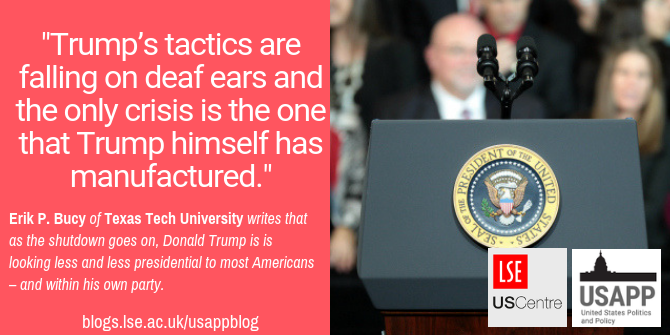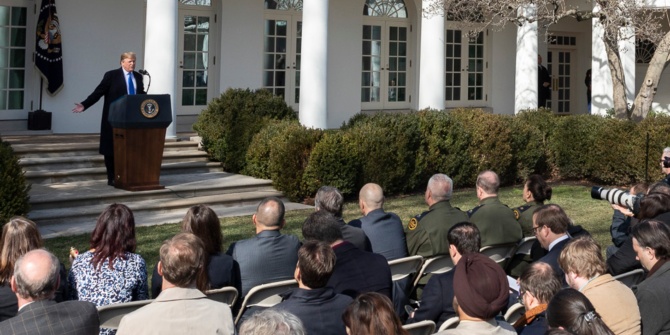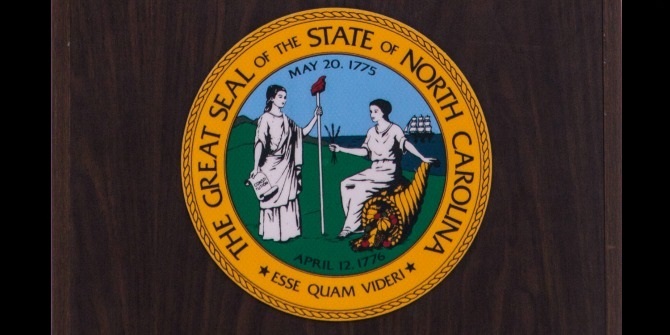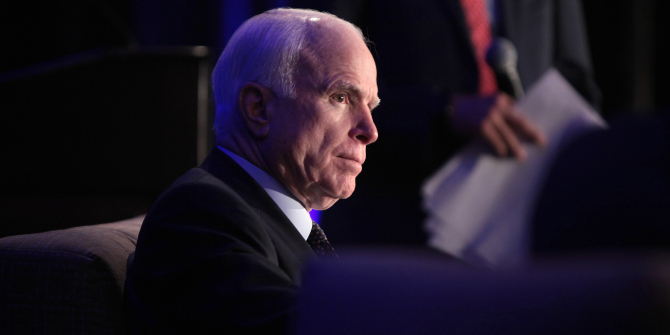 By the end of this week, the current government shutdown will be the longest in US history. Erik P. Bucy writes that the shutdown – which has been manufactured by President Trump’s paranoid vision of an America under siege from undocumented ‘outsiders’ – is at an inflection point as thousands of federal workers go without pay and government services grind to a halt. Trump’s stubborn stance, he writes, is now at the boundary of what most Americans – and many Republicans- feel is acceptable behavior from a President of the United States.
By the end of this week, the current government shutdown will be the longest in US history. Erik P. Bucy writes that the shutdown – which has been manufactured by President Trump’s paranoid vision of an America under siege from undocumented ‘outsiders’ – is at an inflection point as thousands of federal workers go without pay and government services grind to a halt. Trump’s stubborn stance, he writes, is now at the boundary of what most Americans – and many Republicans- feel is acceptable behavior from a President of the United States.
As the federal government shutdown lurches into its third week over a dispute between President Trump and House Democrats about funding for his unnecessary border ‘wall,’ the president took to national television with half-hearted theatrics and unconvincing arguments in a lackluster attempt to persuade a jaded nation that all our attention needs to be directed towards the border with Mexico. It doesn’t.
Meanwhile, hundreds of thousands of federal workers will miss their paychecks this week and any number of vital domestic services performed by the government—from (ironically) border protection to food inspection, airport security to national parks—have either ground to a halt or are relying on the largesse of workers who have been needlessly furloughed to remain at their posts for free. While withdrawing from real crises around the world, Trump through his own chaotic design maintains an obsessive focus on the border, creating a humanitarian crisis through ill-conceived and inhumane policies that detain and incarcerate migrant families.
Such is the price of a presidency based on vilification of ‘outsiders,’ vague populist appeals, and an extreme aversion to democratic pluralism. The echoes of Trump’s approach to leadership with rightwing authoritarianism in Europe, South America, and beyond are resounding—and his vision of the country equally disturbing. Trump’s America is a barricaded place, with walls and travel restrictions, workplace raids to ferret out ‘illegals’, policies that separate migrant children from their parents, and a legally exposed strongman for a chief executive. It’s a skewed vision of the country concocted by former Trump adviser Steve Bannon and fellow conspiratorialists in the dark, nether regions of the alt-media universe.
Trump’s ungainly obsession with immigrants feels less like political representation for all Americans and more like white nationalism for some Americans. The issues at the border are no Cuban Missile Crisis, they do not represent an existential threat to the nation—only a threat to Trump’s political survival (which, for Trump, is a real threat). Experts agree that the ‘wall’ is wholly unnecessary from a border security standpoint but continues to hold value for Trump politically, as a form of visual propaganda that symbolizes his anti-immigrant bias and need to appear as if he is fulfilling campaign promises.
Reality, in Trump’s world, just doesn’t matter. Force fitting misguided initiatives onto a dubious understanding of policy making only to please his base and realize a false and predetermined narrative about society does. Adding to the strangeness, the Trump administration’s assertion of a ‘national security crisis’ at the border, presumably to justify unilateral executive action to build a ‘wall’, may presage legal action and a wider constitutional crisis if he attempts to act on such demonstrably false pretenses.
Echoes of Gingrich
Shutting down the government to score ideological points with extreme elements of the conservative base (perhaps the only group tolerant of the idea of shutdowns), is not a new tactic. In a high-stakes game of brinksmanship over the 1996 federal budget led by then-Speaker Newt Gingrich, members of the 104th Congress, including 73 Republican freshmen, demanded that President Bill Clinton agree to balancing the federal budget in seven years and accept other policy proposals contained in Gingrich’s ‘Contract with America’ in exchange for keeping the government open (ironic now, given Republican apathy over deficit spending, as long as its driven by tax cuts).
Clinton called the Republicans’ bluff, vetoing their appropriations bills and triggering two shutdowns that were then-unprecedented in their length and cost—the first (in November 1995) lasted 6 days, while the second (16 December 1995 to 5 January 1996) lasted 21 days. The Office of Management and Budget estimated that the second shutdown alone cost taxpayers more than $1.25 billion (over $2 billion in today’s dollars). At this point, economists say it is cheaper to keep the government open than it is to shut it down.
Although Gingrich claimed public support for the legislation embodied in the ‘Contract with America’, both elite and public opinion united against the hardline approach that forced the government closures he set up. Conservative commentator Kevin Phillips, in a column titled ‘Why This Congress Must Be Considered the Worst in a Half-Century’, noted the ‘stunning’ collapse of public support for congressional GOP policies and tactics in the aftermath of the shutdowns.

“Presidential podium” by Gage Skidmore is licensed under CC BY SA 2.0.
Setting aside the merits of a border ‘wall’ policy, Trump would do well to heed the political lessons of 1996 when Clinton bluntly described GOP tactics as ‘an exercise of raw, naked power’. Similar to Trump, Gingrich has been credited with undermining democratic norms and amplifying partisan discord. Gingrich endeavored to foist fallout from the shutdown onto Clinton, but he ending up owning the debacle and it signaled the beginning of his eventual political downfall.
There is no pretense among anyone observing this slow-moving train wreck that the current shutdown is anyone’s doing but Trump’s.
Perceptions of Legitimacy
In a climate of generalized cynicism toward politics and declining trust in government, visible disdain for the processes, norms, and traditions of government, exacerbated in Trump’s case by severe denial of empirical reality, diminishes perceptions of legitimacy and effectiveness while generating widespread anger and unease. The fallout from arbitrary governmental action roils markets, disrupts lives, and perpetuates cynicism and alienation in the electorate. Government doesn’t work if those elected to run it want nothing more than to jam the machinery for political advantage.
A century ago, the sociologist Max Weber commented that schisms between different branches of government are revealing because they bring into clear view patterns of power in a society. The prolonged furlough of roughly 800,000 federal workers due to the impasse between the Republican president and Democratic Congress evokes an enduring question Weber asked in The Theory of Social and Economic Organization: ‘What determines the actual power structure is the answer to the question. What would happen if a constitutionally necessary compromise, such as that over the budget, were not arrived at?’ We’re in the process of finding out.
In 1996, Bill Clinton outlasted the Gingrich-led uprising and sailed to reelection victory. But Clinton was on the side of political moderation, common sense, and shared values. Donald Trump is not. Looking to 2020, Trump may have just squandered the last bit of goodwill he had beyond his most fervent supporters. Using federal workers as pawns (and collectively dismissing most of them as ‘Democrats’), cajoling the public with false declarations of an emergency, and insisting on a juvenile demand comes up short of presidential.
Citizen Expectations and Power
In the wake of the Clinton-era shutdowns, I studied people’s perceptions of political power by fielding a questionnaire to residents of suburban Maryland asking about their opinions of the furloughs. One question in particular yielded rich insight: ‘Briefly describe how politicians get power over the average person.’ From the analysis, I was able to identify three distinct perceptions: power acquired by means of institutionally sanctioned processes (e.g., making laws and policy, taxing and spending, raising campaign contributions); power acquired by means of coercive processes (e.g., persuading the apathetic or uninformed, lying or deceiving, setting the public agenda through the media); and, power acquired by means of representational processes (e.g., speaking for others as elected representatives). I then examined which voter characteristics most closely associated with these varying outlooks.
The study found that political sophistication differentiates conceptions of political power as institutionally sanctioned or representationally based on the one hand, from conceptions of political power as coercive on the other. In other words, the more sophisticated respondents were, the more they associated political power with institutional and democratic processes. The more elaborated one’s political belief system, the more power is viewed as a multifaceted process. And politically sophisticated citizens recognize authoritative power deriving from electoral legitimacy and the consent of the governed rather than outright coercion or domination.
Less sophisticated and politically aware persons, on the other hand, are more likely to regard power as coercive, which may explain why groups lower in education and socioeconomic status tend to be more supportive of authoritarian figures and regimes. Persons who accept and define power as compelled by force or intimidation seem more tolerant and accepting of dogmatic political behavior.
In today’s de-normed political climate, much of the adjudication of excess executive power is expected of the courts. But citizen expectations about the appropriate political behavior of leaders within a government, along with criticism from fellow elites, also delimits the acceptable range of executive actions. And politically interested citizens take their cues from elites. With a new power balance in Congress and anti-Trump narratives emerging on Capitol Hill, Trump’s personal influence in Washington is diminishing by the day.
The stability of political systems relies on the assent and acquiescence not just of primary voters and core supporters but the broader national polity. As Trump continues to follow his impulses and play exclusively to his base, he risks rising instability.
Trumped-up Outrage
Regardless of issue, the go-to emotion for Trump is outrage. In order for trumped up outrage to work, there not only needs to be a scapegoat—there needs to be an accepting audience. Before last fall’s midterm elections, which returned control of Congress back to the Democrats, Trump and his friends at Fox News were attempting to frighten voters about the ‘migrant caravan’ trekking to the border on foot from Honduras, Guatemala, and El Salvador, a determined but peaceful group of about 7,000 migrants who had the intention of surrendering and asking for asylum. Trump’s border control agents tear-gassed many them instead. It was an ugly set of optics.
The day after the election, after the Republicans lost the House, Trump went silent about the issue—not because the situation had changed in any material sense (the migrants were never a threat) but because their political value had vanquished. Now that the Democrats have taken back control of the House, we’re catapulted back into border crisis mode. Trump can’t leave it alone, and his artifice and opportunistic interest in the border is breathtaking. But Trump’s tactics are falling on deaf ears and the only crisis is the one that Trump himself has manufactured.
As the Democrats stand their ground and the president ad libs his attempt to win over public sentiment, the consensus around Trump, if there ever was one, is rapidly eroding. Indeed, there are now calls from a growing number of Republicans to back down on his border demands and from critics for his censure and removal from office. It should be noted, too: These are the political conditions before the much-anticipated release of the Mueller Report investigating Russian interference in the 2016 presidential campaign. Republican solidarity following its release now seems like a distant prospect at best.
Please read our comments policy before commenting.
Note: This article gives the views of the author, and not the position of USAPP– American Politics and Policy, nor of the London School of Economics.
Shortened URL for this post: https://bit.ly/2H6cvJg
About the author
 Erik Bucy – Texas Tech University
Erik Bucy – Texas Tech University
Erik Bucy, a former Visiting Senior Fellow in the Department of Government at the LSE, is the Marshall and Sharleen Formby Regents Professor of Strategic Communication at Texas Tech University. He can be reached at erik.bucy@ttu.edu or @erikpbucy on Twitter.






